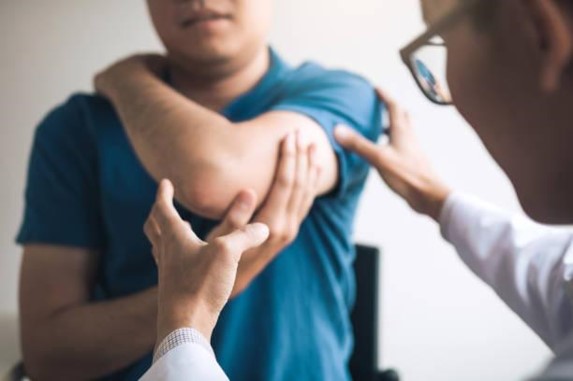Have you struggled with painful or swollen joints or endured pain performing repetitive motions such as climbing the stairs? If you have, you could be suffering from an orthopaedic related pain and should see an orthopaedic specialist for it.
According to the Merriam-Webster dictionary, orthopaedics is “a branch of medicine concerned with correcting or preventing deformities, disorders, or injuries of the skeleton and associated structures (such as tendons and ligaments)”. Orthopaedics also includes the treatment of all injuries to the skeleton and associated structures and pain related to your muscles, tendons, ligaments, and even nerve structures.
Here are some signs that indicate you should see an orthopaedic doctor in Singapore as soon as possible:
You Have Difficulties Doing Your Usual Activities
If you find yourself facing difficulties doing activities that you had previously been able to easily do, or increasingly find yourself feeling discomfort and stiffness in your hips, knees or other joints across the body, this may be a cause for concern.
You may be suffering from a degenerative or arthritic joint condition that affects your activities of daily living (“ADL”). An orthopaedic doctor can help assess the severity of your situation and recommend the appropriate treatments.
You Suffer From Chronic Pain
Another sign is if you suffer from chronic pain. Chronic pain refers to a prolonged period of feeling pain, usually lasting more than three months.
Chronic pain can result from an injury that has not healed well causing nerve sensitivity or from weak muscles that cannot support a joint sufficiently. The pain can happen in nearly any joint of your body, from your shoulders and elbows to your back, hip, or knees.
To identify the causes of chronic orthopaedic pain, an orthopaedic doctor will run assessments and imaging through X-Rays or MRIs, which help direct the right course of treatment.
Stiffness And Reduced Range Of Motion To Your Joints
Some factors which indicate that your stiffness is contributing to joint pain include that:
- You usually feel the stiffest upon the first 5 to 10 minutes of waking up in the morning. However, you start to feel better once you have moved around a little bit (people often call this ‘warming up the joints’!)
- You require support to perform activities that require you to use multiple joints, like squatting on the ground and getting up.
- You find it challenging to bend your joints beyond a certain point and you may even feel a stretching tightness once you reach your limit.
Stiffness can often quickly lead to orthopaedic pain as your joints and muscles cannot move fully, resulting in difficulties in mobility and strength.

You Experience Instability While Standing Or Walking
Another sign is instability while standing or walking. Instability can be challenging to notice as most people may mistake it as being ‘clumsy’ or assume the instability is caused by an old injury. However, instability that happens when a joint is injured or stretched beyond its normal limits can look like this:
- Feeling shaky or ‘unstable’ as if you are about to fall or trip when you walk across uneven surfaces.
- Having your knee ‘buckle’ or ‘catching’ while you are standing for long periods.
- Sudden swelling of the joint after a period of physical activity.
- Sudden ‘locking’ of the joint followed by the inability to straighten out their limb for a while.
Instability is an indication that your joints cannot support you in the event of slips or falls. It increases the chances of a severe injury, risking a ruptured tendon or ligament, or worse – a fractured bone. If you have any of these symptoms, you will need to consult with your orthopaedic doctor in Singapore.
Signs Of Infection
Infections can also cause severe orthopaedic pain and require immediate treatment. Infections can occur in a joint due to an open wound, such as from a skin infection or urinary tract infection, which spreads through your bloodstream to a joint. There will then be swelling, redness, a throbbing pain, and the skin will feel hot to touch if there is an infection
You Have Suffered A Soft Tissue Injury That Hasn’t Improved In 48 Hours
If you had a fall or traumatic injury to a joint and the pain or swelling does not subside after more than two days, you may require immediate medical attention. Injuries to soft tissues can include:
- Muscles – A traumatic injury to a muscle belly can result in a muscular haematoma, resulting in a pool of blood that collects within the damaged tissue. A lump may form around the area, along with pain and limitation in movement.
- Tendons & Ligaments – These are the soft tissues which stabilise your joints. Any injured tendons or ligaments could make walking difficult, and swelling that does not improve with icing and rest may require further imaging.
- Bursa – Bursitis is the inflammation of the bursa, a fluid-filled sac, that helps to reduce friction between joints or other tissues of the body during movements. Bursitis can be excruciating and requires monitoring to ensure that it is recovering well.
Joint Pain That Increases In Intensity Even During Periods Of Rest
It is not normal for a painful joint to become even more painful during rest periods! Feeling increased pain can indicate inflammatory type of arthritis, such as rheumatoid or psoriatic arthritis, or an active infection within the joint. Both conditions will require further blood tests and medication to treat.
Understanding these symptoms is vital to detect when you need to consult with an orthopaedic pain doctor in Singapore.
Dr. Ananda Vella is a Singapore and Swiss-double-fellowship-trained MOH-accredited orthopaedic specialist consultant surgeon, As a former consultant from the Singapore General Hospital and Sengkang General Hospital and with more than 20 years of experience, Dr Ananda treats a variety of orthopaedic bone and joint conditions, including in his subspecialty focus of foot and ankle conditions, hip and knee pains, as well as sports injuries. Dr Ananda is also well-versed in minimally invasive surgical techniques, including having performed the first lateral total ankle replacement surgery in South-east Asia to improve outcomes for patients with severe arthritis.
Dr Ananda regularly practices in 3 clinics across Singapore and is accredited to operate in all private hospitals in Singapore. Should you have any queries or need any further assistance, please do not hesitate to schedule an appointment with our Dr Ananda by WhatsApp at 8860 0642 for assistance. Alternatively, please leave us a message via the enquiry form and we will get back to you as soon as possible.
(All Rights Reserved)




